Cultural Competency in Nursing: Patient-Centered Care Across Cultures
VerifiedAdded on 2023/01/16
|11
|3565
|42
Essay
AI Summary
This essay delves into the critical importance of cultural competency in nursing, emphasizing its impact on patient satisfaction and treatment adherence. It defines cultural competency as the ability of healthcare providers to meet the diverse cultural, social, and linguistic needs of patients, fostering improved outcomes and mutual understanding. The assignment examines the specific cultural considerations for four distinct patient profiles: a 45-year-old Aboriginal and Torres Islander individual, a 60-year-old Muslim patient with hypertension, a 70-year-old Greek patient with asthma, and a 25-year-old Sudanese patient experiencing abdominal pain. The essay highlights the significance of cultural awareness and knowledge, discussing communication styles, family dynamics, religious beliefs, and traditional practices relevant to each patient group. It provides practical guidance on how nurses can adapt their approach to ensure culturally sensitive and effective care, including strategies for building rapport, respecting cultural norms, and incorporating patient preferences into treatment plans. The essay stresses the need for healthcare professionals to be mindful of non-verbal cues, family involvement, and the impact of cultural beliefs on health perceptions and behaviors, ultimately advocating for patient-centered care that honors each individual's unique background and experiences.
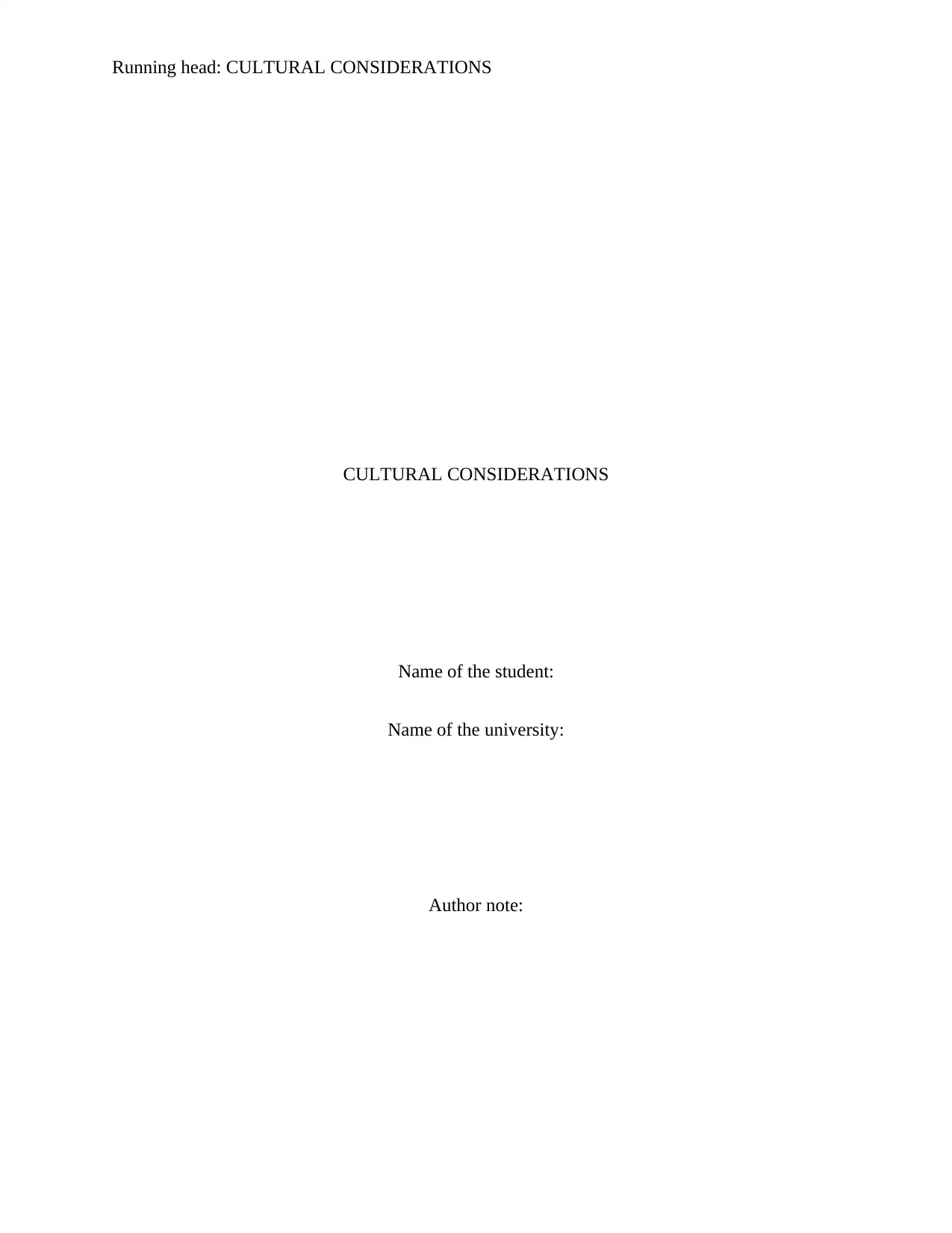
Running head: CULTURAL CONSIDERATIONS
CULTURAL CONSIDERATIONS
Name of the student:
Name of the university:
Author note:
CULTURAL CONSIDERATIONS
Name of the student:
Name of the university:
Author note:
Paraphrase This Document
Need a fresh take? Get an instant paraphrase of this document with our AI Paraphraser
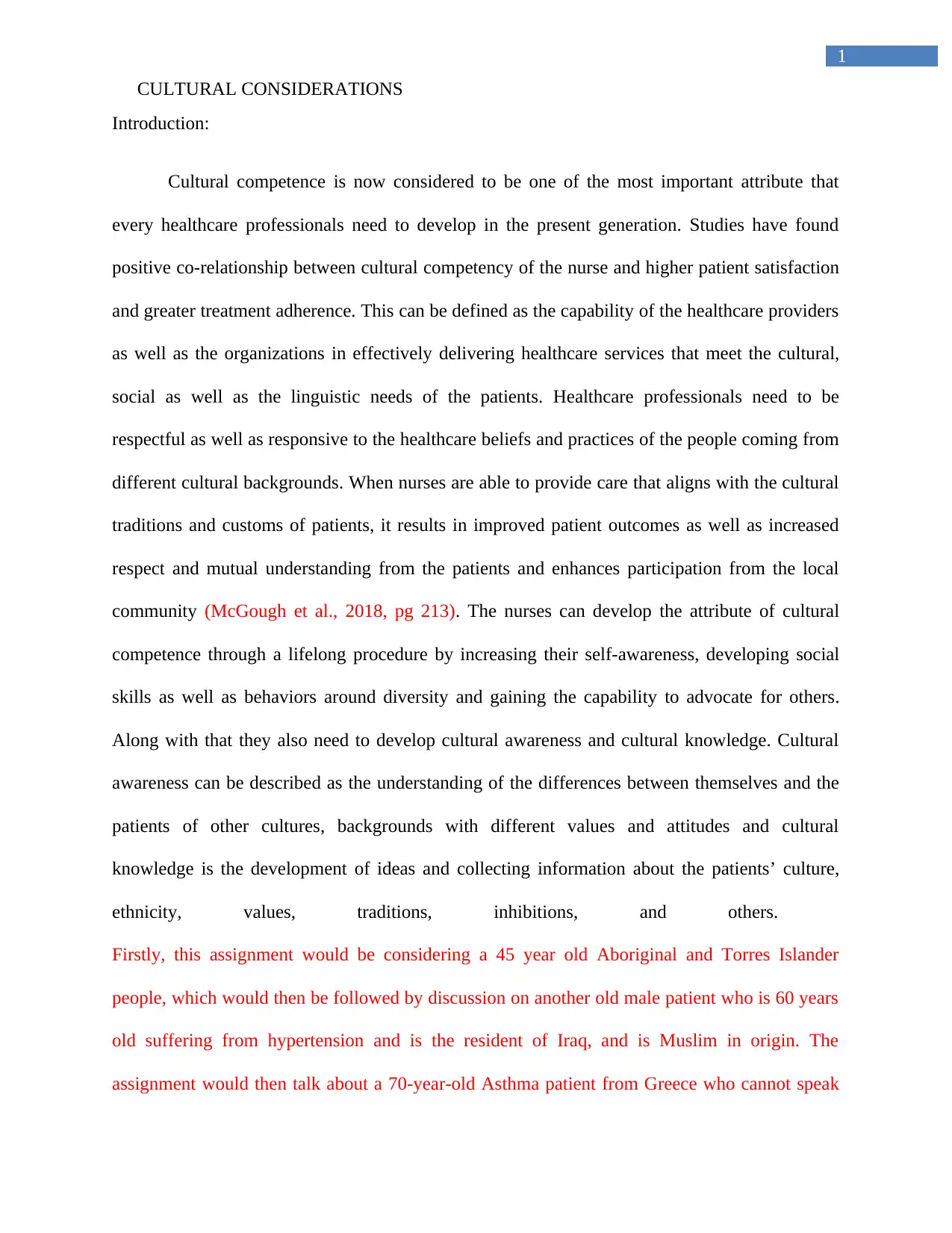
1
CULTURAL CONSIDERATIONS
Introduction:
Cultural competence is now considered to be one of the most important attribute that
every healthcare professionals need to develop in the present generation. Studies have found
positive co-relationship between cultural competency of the nurse and higher patient satisfaction
and greater treatment adherence. This can be defined as the capability of the healthcare providers
as well as the organizations in effectively delivering healthcare services that meet the cultural,
social as well as the linguistic needs of the patients. Healthcare professionals need to be
respectful as well as responsive to the healthcare beliefs and practices of the people coming from
different cultural backgrounds. When nurses are able to provide care that aligns with the cultural
traditions and customs of patients, it results in improved patient outcomes as well as increased
respect and mutual understanding from the patients and enhances participation from the local
community (McGough et al., 2018, pg 213). The nurses can develop the attribute of cultural
competence through a lifelong procedure by increasing their self-awareness, developing social
skills as well as behaviors around diversity and gaining the capability to advocate for others.
Along with that they also need to develop cultural awareness and cultural knowledge. Cultural
awareness can be described as the understanding of the differences between themselves and the
patients of other cultures, backgrounds with different values and attitudes and cultural
knowledge is the development of ideas and collecting information about the patients’ culture,
ethnicity, values, traditions, inhibitions, and others.
Firstly, this assignment would be considering a 45 year old Aboriginal and Torres Islander
people, which would then be followed by discussion on another old male patient who is 60 years
old suffering from hypertension and is the resident of Iraq, and is Muslim in origin. The
assignment would then talk about a 70-year-old Asthma patient from Greece who cannot speak
CULTURAL CONSIDERATIONS
Introduction:
Cultural competence is now considered to be one of the most important attribute that
every healthcare professionals need to develop in the present generation. Studies have found
positive co-relationship between cultural competency of the nurse and higher patient satisfaction
and greater treatment adherence. This can be defined as the capability of the healthcare providers
as well as the organizations in effectively delivering healthcare services that meet the cultural,
social as well as the linguistic needs of the patients. Healthcare professionals need to be
respectful as well as responsive to the healthcare beliefs and practices of the people coming from
different cultural backgrounds. When nurses are able to provide care that aligns with the cultural
traditions and customs of patients, it results in improved patient outcomes as well as increased
respect and mutual understanding from the patients and enhances participation from the local
community (McGough et al., 2018, pg 213). The nurses can develop the attribute of cultural
competence through a lifelong procedure by increasing their self-awareness, developing social
skills as well as behaviors around diversity and gaining the capability to advocate for others.
Along with that they also need to develop cultural awareness and cultural knowledge. Cultural
awareness can be described as the understanding of the differences between themselves and the
patients of other cultures, backgrounds with different values and attitudes and cultural
knowledge is the development of ideas and collecting information about the patients’ culture,
ethnicity, values, traditions, inhibitions, and others.
Firstly, this assignment would be considering a 45 year old Aboriginal and Torres Islander
people, which would then be followed by discussion on another old male patient who is 60 years
old suffering from hypertension and is the resident of Iraq, and is Muslim in origin. The
assignment would then talk about a 70-year-old Asthma patient from Greece who cannot speak
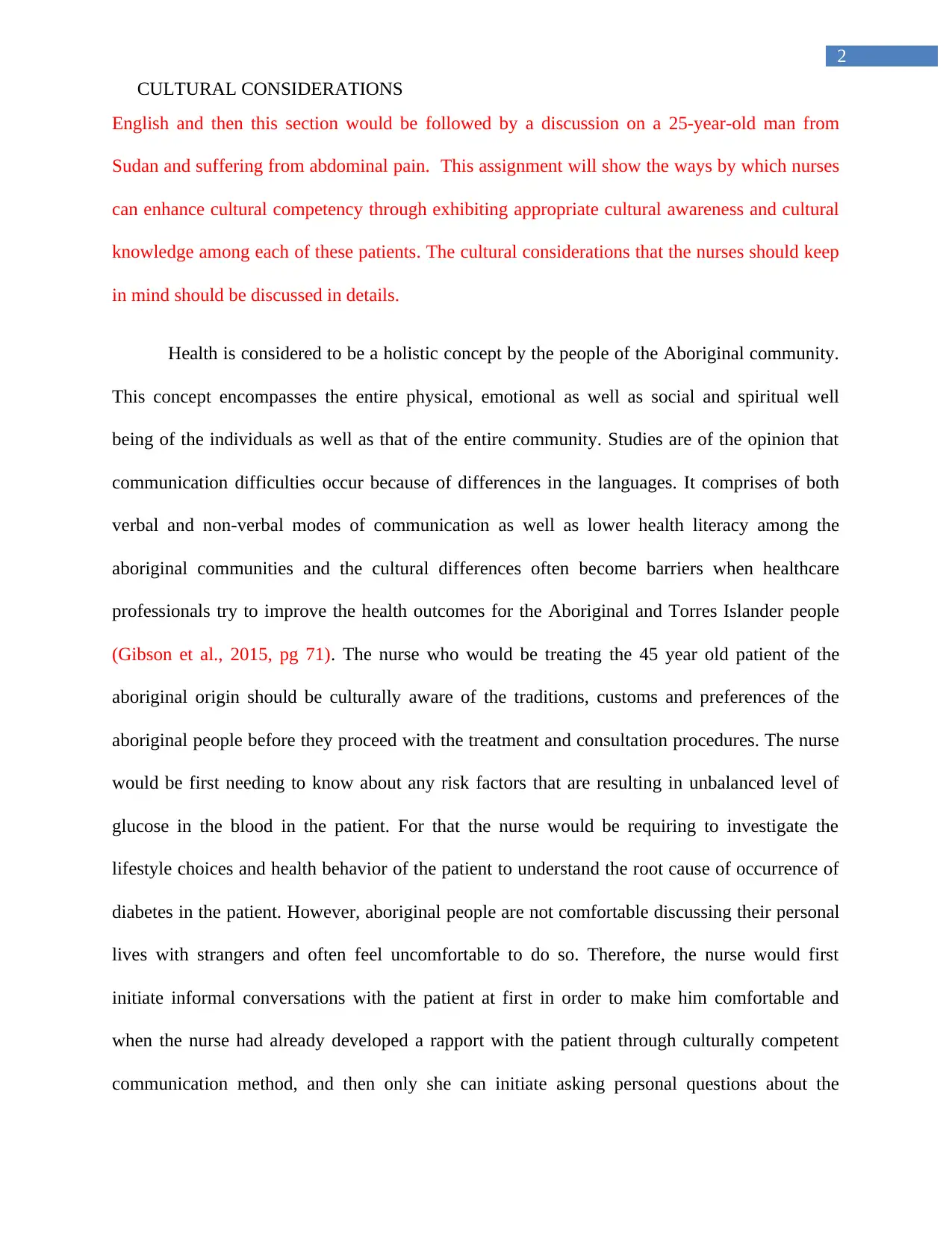
2
CULTURAL CONSIDERATIONS
English and then this section would be followed by a discussion on a 25-year-old man from
Sudan and suffering from abdominal pain. This assignment will show the ways by which nurses
can enhance cultural competency through exhibiting appropriate cultural awareness and cultural
knowledge among each of these patients. The cultural considerations that the nurses should keep
in mind should be discussed in details.
Health is considered to be a holistic concept by the people of the Aboriginal community.
This concept encompasses the entire physical, emotional as well as social and spiritual well
being of the individuals as well as that of the entire community. Studies are of the opinion that
communication difficulties occur because of differences in the languages. It comprises of both
verbal and non-verbal modes of communication as well as lower health literacy among the
aboriginal communities and the cultural differences often become barriers when healthcare
professionals try to improve the health outcomes for the Aboriginal and Torres Islander people
(Gibson et al., 2015, pg 71). The nurse who would be treating the 45 year old patient of the
aboriginal origin should be culturally aware of the traditions, customs and preferences of the
aboriginal people before they proceed with the treatment and consultation procedures. The nurse
would be first needing to know about any risk factors that are resulting in unbalanced level of
glucose in the blood in the patient. For that the nurse would be requiring to investigate the
lifestyle choices and health behavior of the patient to understand the root cause of occurrence of
diabetes in the patient. However, aboriginal people are not comfortable discussing their personal
lives with strangers and often feel uncomfortable to do so. Therefore, the nurse would first
initiate informal conversations with the patient at first in order to make him comfortable and
when the nurse had already developed a rapport with the patient through culturally competent
communication method, and then only she can initiate asking personal questions about the
CULTURAL CONSIDERATIONS
English and then this section would be followed by a discussion on a 25-year-old man from
Sudan and suffering from abdominal pain. This assignment will show the ways by which nurses
can enhance cultural competency through exhibiting appropriate cultural awareness and cultural
knowledge among each of these patients. The cultural considerations that the nurses should keep
in mind should be discussed in details.
Health is considered to be a holistic concept by the people of the Aboriginal community.
This concept encompasses the entire physical, emotional as well as social and spiritual well
being of the individuals as well as that of the entire community. Studies are of the opinion that
communication difficulties occur because of differences in the languages. It comprises of both
verbal and non-verbal modes of communication as well as lower health literacy among the
aboriginal communities and the cultural differences often become barriers when healthcare
professionals try to improve the health outcomes for the Aboriginal and Torres Islander people
(Gibson et al., 2015, pg 71). The nurse who would be treating the 45 year old patient of the
aboriginal origin should be culturally aware of the traditions, customs and preferences of the
aboriginal people before they proceed with the treatment and consultation procedures. The nurse
would be first needing to know about any risk factors that are resulting in unbalanced level of
glucose in the blood in the patient. For that the nurse would be requiring to investigate the
lifestyle choices and health behavior of the patient to understand the root cause of occurrence of
diabetes in the patient. However, aboriginal people are not comfortable discussing their personal
lives with strangers and often feel uncomfortable to do so. Therefore, the nurse would first
initiate informal conversations with the patient at first in order to make him comfortable and
when the nurse had already developed a rapport with the patient through culturally competent
communication method, and then only she can initiate asking personal questions about the
⊘ This is a preview!⊘
Do you want full access?
Subscribe today to unlock all pages.

Trusted by 1+ million students worldwide
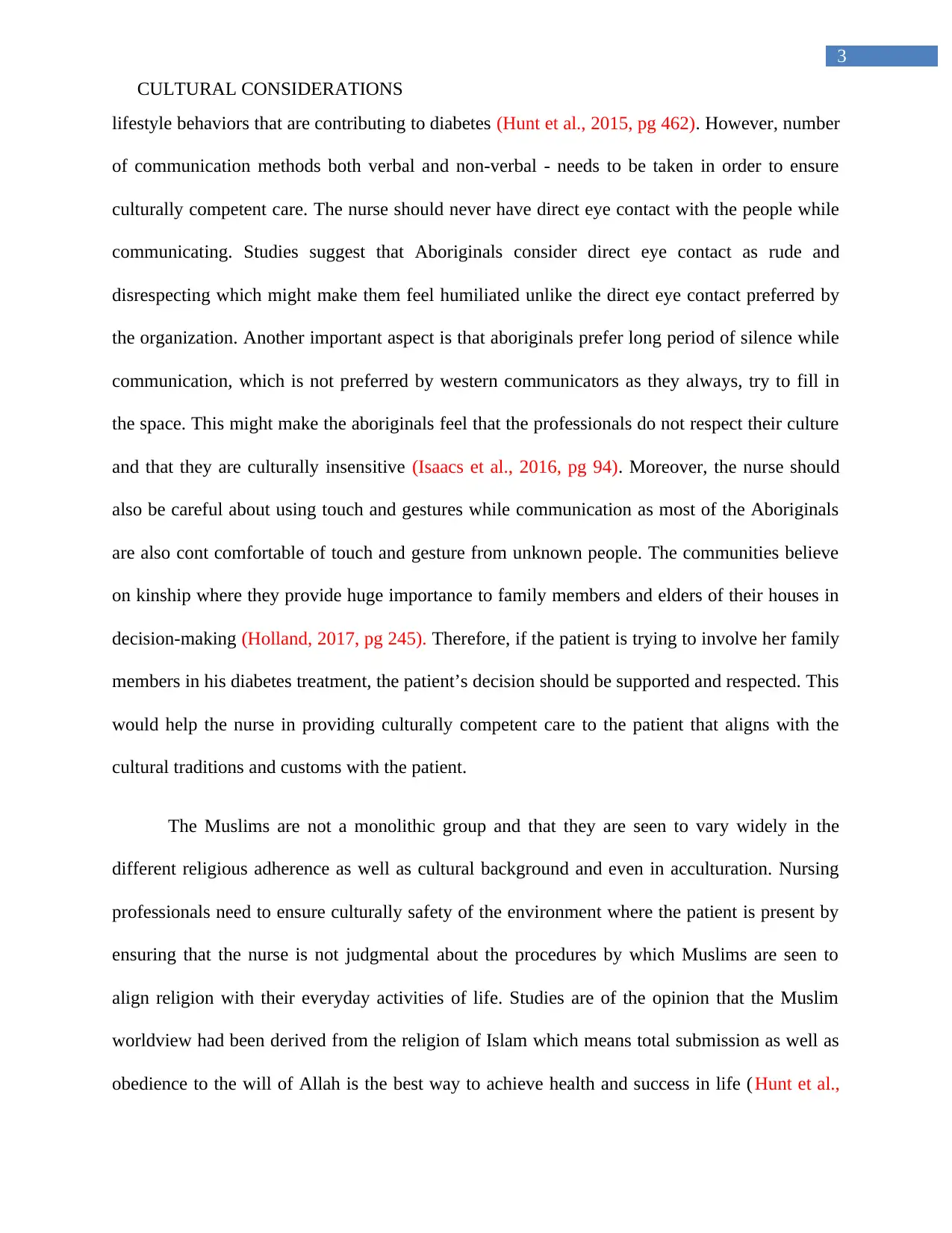
3
CULTURAL CONSIDERATIONS
lifestyle behaviors that are contributing to diabetes (Hunt et al., 2015, pg 462). However, number
of communication methods both verbal and non-verbal - needs to be taken in order to ensure
culturally competent care. The nurse should never have direct eye contact with the people while
communicating. Studies suggest that Aboriginals consider direct eye contact as rude and
disrespecting which might make them feel humiliated unlike the direct eye contact preferred by
the organization. Another important aspect is that aboriginals prefer long period of silence while
communication, which is not preferred by western communicators as they always, try to fill in
the space. This might make the aboriginals feel that the professionals do not respect their culture
and that they are culturally insensitive (Isaacs et al., 2016, pg 94). Moreover, the nurse should
also be careful about using touch and gestures while communication as most of the Aboriginals
are also cont comfortable of touch and gesture from unknown people. The communities believe
on kinship where they provide huge importance to family members and elders of their houses in
decision-making (Holland, 2017, pg 245). Therefore, if the patient is trying to involve her family
members in his diabetes treatment, the patient’s decision should be supported and respected. This
would help the nurse in providing culturally competent care to the patient that aligns with the
cultural traditions and customs with the patient.
The Muslims are not a monolithic group and that they are seen to vary widely in the
different religious adherence as well as cultural background and even in acculturation. Nursing
professionals need to ensure culturally safety of the environment where the patient is present by
ensuring that the nurse is not judgmental about the procedures by which Muslims are seen to
align religion with their everyday activities of life. Studies are of the opinion that the Muslim
worldview had been derived from the religion of Islam which means total submission as well as
obedience to the will of Allah is the best way to achieve health and success in life (Hunt et al.,
CULTURAL CONSIDERATIONS
lifestyle behaviors that are contributing to diabetes (Hunt et al., 2015, pg 462). However, number
of communication methods both verbal and non-verbal - needs to be taken in order to ensure
culturally competent care. The nurse should never have direct eye contact with the people while
communicating. Studies suggest that Aboriginals consider direct eye contact as rude and
disrespecting which might make them feel humiliated unlike the direct eye contact preferred by
the organization. Another important aspect is that aboriginals prefer long period of silence while
communication, which is not preferred by western communicators as they always, try to fill in
the space. This might make the aboriginals feel that the professionals do not respect their culture
and that they are culturally insensitive (Isaacs et al., 2016, pg 94). Moreover, the nurse should
also be careful about using touch and gestures while communication as most of the Aboriginals
are also cont comfortable of touch and gesture from unknown people. The communities believe
on kinship where they provide huge importance to family members and elders of their houses in
decision-making (Holland, 2017, pg 245). Therefore, if the patient is trying to involve her family
members in his diabetes treatment, the patient’s decision should be supported and respected. This
would help the nurse in providing culturally competent care to the patient that aligns with the
cultural traditions and customs with the patient.
The Muslims are not a monolithic group and that they are seen to vary widely in the
different religious adherence as well as cultural background and even in acculturation. Nursing
professionals need to ensure culturally safety of the environment where the patient is present by
ensuring that the nurse is not judgmental about the procedures by which Muslims are seen to
align religion with their everyday activities of life. Studies are of the opinion that the Muslim
worldview had been derived from the religion of Islam which means total submission as well as
obedience to the will of Allah is the best way to achieve health and success in life (Hunt et al.,
Paraphrase This Document
Need a fresh take? Get an instant paraphrase of this document with our AI Paraphraser
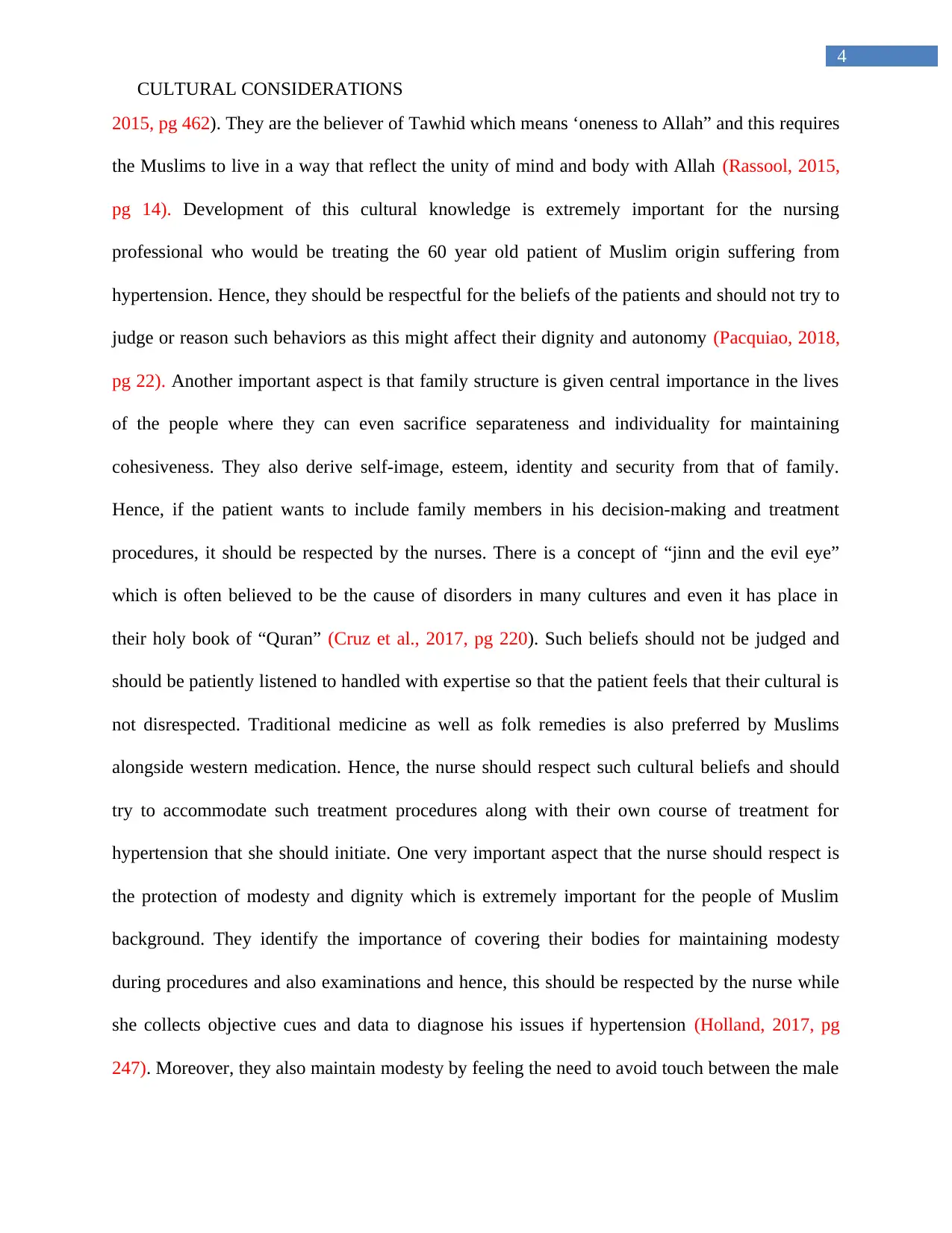
4
CULTURAL CONSIDERATIONS
2015, pg 462). They are the believer of Tawhid which means ‘oneness to Allah” and this requires
the Muslims to live in a way that reflect the unity of mind and body with Allah (Rassool, 2015,
pg 14). Development of this cultural knowledge is extremely important for the nursing
professional who would be treating the 60 year old patient of Muslim origin suffering from
hypertension. Hence, they should be respectful for the beliefs of the patients and should not try to
judge or reason such behaviors as this might affect their dignity and autonomy (Pacquiao, 2018,
pg 22). Another important aspect is that family structure is given central importance in the lives
of the people where they can even sacrifice separateness and individuality for maintaining
cohesiveness. They also derive self-image, esteem, identity and security from that of family.
Hence, if the patient wants to include family members in his decision-making and treatment
procedures, it should be respected by the nurses. There is a concept of “jinn and the evil eye”
which is often believed to be the cause of disorders in many cultures and even it has place in
their holy book of “Quran” (Cruz et al., 2017, pg 220). Such beliefs should not be judged and
should be patiently listened to handled with expertise so that the patient feels that their cultural is
not disrespected. Traditional medicine as well as folk remedies is also preferred by Muslims
alongside western medication. Hence, the nurse should respect such cultural beliefs and should
try to accommodate such treatment procedures along with their own course of treatment for
hypertension that she should initiate. One very important aspect that the nurse should respect is
the protection of modesty and dignity which is extremely important for the people of Muslim
background. They identify the importance of covering their bodies for maintaining modesty
during procedures and also examinations and hence, this should be respected by the nurse while
she collects objective cues and data to diagnose his issues if hypertension (Holland, 2017, pg
247). Moreover, they also maintain modesty by feeling the need to avoid touch between the male
CULTURAL CONSIDERATIONS
2015, pg 462). They are the believer of Tawhid which means ‘oneness to Allah” and this requires
the Muslims to live in a way that reflect the unity of mind and body with Allah (Rassool, 2015,
pg 14). Development of this cultural knowledge is extremely important for the nursing
professional who would be treating the 60 year old patient of Muslim origin suffering from
hypertension. Hence, they should be respectful for the beliefs of the patients and should not try to
judge or reason such behaviors as this might affect their dignity and autonomy (Pacquiao, 2018,
pg 22). Another important aspect is that family structure is given central importance in the lives
of the people where they can even sacrifice separateness and individuality for maintaining
cohesiveness. They also derive self-image, esteem, identity and security from that of family.
Hence, if the patient wants to include family members in his decision-making and treatment
procedures, it should be respected by the nurses. There is a concept of “jinn and the evil eye”
which is often believed to be the cause of disorders in many cultures and even it has place in
their holy book of “Quran” (Cruz et al., 2017, pg 220). Such beliefs should not be judged and
should be patiently listened to handled with expertise so that the patient feels that their cultural is
not disrespected. Traditional medicine as well as folk remedies is also preferred by Muslims
alongside western medication. Hence, the nurse should respect such cultural beliefs and should
try to accommodate such treatment procedures along with their own course of treatment for
hypertension that she should initiate. One very important aspect that the nurse should respect is
the protection of modesty and dignity which is extremely important for the people of Muslim
background. They identify the importance of covering their bodies for maintaining modesty
during procedures and also examinations and hence, this should be respected by the nurse while
she collects objective cues and data to diagnose his issues if hypertension (Holland, 2017, pg
247). Moreover, they also maintain modesty by feeling the need to avoid touch between the male
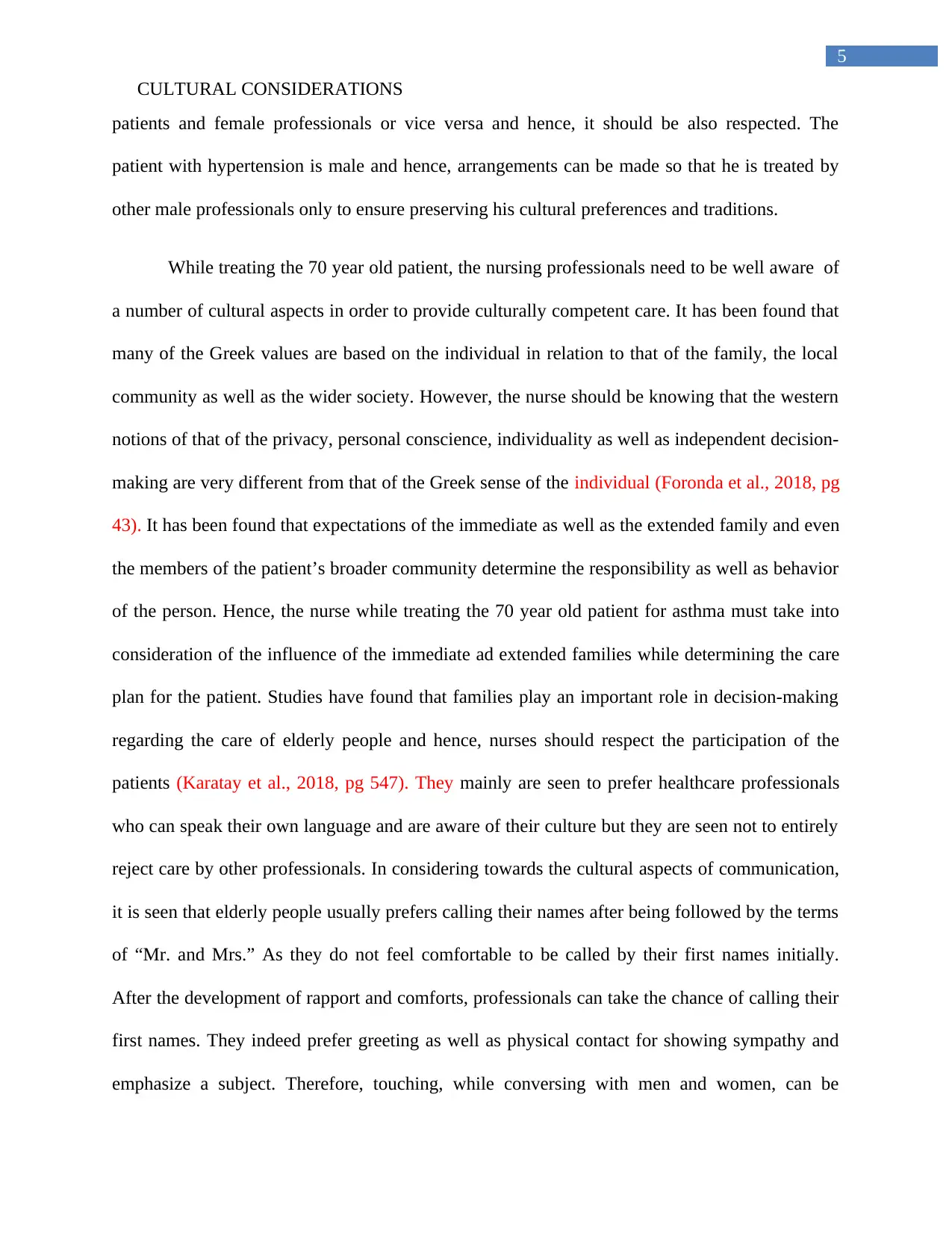
5
CULTURAL CONSIDERATIONS
patients and female professionals or vice versa and hence, it should be also respected. The
patient with hypertension is male and hence, arrangements can be made so that he is treated by
other male professionals only to ensure preserving his cultural preferences and traditions.
While treating the 70 year old patient, the nursing professionals need to be well aware of
a number of cultural aspects in order to provide culturally competent care. It has been found that
many of the Greek values are based on the individual in relation to that of the family, the local
community as well as the wider society. However, the nurse should be knowing that the western
notions of that of the privacy, personal conscience, individuality as well as independent decision-
making are very different from that of the Greek sense of the individual (Foronda et al., 2018, pg
43). It has been found that expectations of the immediate as well as the extended family and even
the members of the patient’s broader community determine the responsibility as well as behavior
of the person. Hence, the nurse while treating the 70 year old patient for asthma must take into
consideration of the influence of the immediate ad extended families while determining the care
plan for the patient. Studies have found that families play an important role in decision-making
regarding the care of elderly people and hence, nurses should respect the participation of the
patients (Karatay et al., 2018, pg 547). They mainly are seen to prefer healthcare professionals
who can speak their own language and are aware of their culture but they are seen not to entirely
reject care by other professionals. In considering towards the cultural aspects of communication,
it is seen that elderly people usually prefers calling their names after being followed by the terms
of “Mr. and Mrs.” As they do not feel comfortable to be called by their first names initially.
After the development of rapport and comforts, professionals can take the chance of calling their
first names. They indeed prefer greeting as well as physical contact for showing sympathy and
emphasize a subject. Therefore, touching, while conversing with men and women, can be
CULTURAL CONSIDERATIONS
patients and female professionals or vice versa and hence, it should be also respected. The
patient with hypertension is male and hence, arrangements can be made so that he is treated by
other male professionals only to ensure preserving his cultural preferences and traditions.
While treating the 70 year old patient, the nursing professionals need to be well aware of
a number of cultural aspects in order to provide culturally competent care. It has been found that
many of the Greek values are based on the individual in relation to that of the family, the local
community as well as the wider society. However, the nurse should be knowing that the western
notions of that of the privacy, personal conscience, individuality as well as independent decision-
making are very different from that of the Greek sense of the individual (Foronda et al., 2018, pg
43). It has been found that expectations of the immediate as well as the extended family and even
the members of the patient’s broader community determine the responsibility as well as behavior
of the person. Hence, the nurse while treating the 70 year old patient for asthma must take into
consideration of the influence of the immediate ad extended families while determining the care
plan for the patient. Studies have found that families play an important role in decision-making
regarding the care of elderly people and hence, nurses should respect the participation of the
patients (Karatay et al., 2018, pg 547). They mainly are seen to prefer healthcare professionals
who can speak their own language and are aware of their culture but they are seen not to entirely
reject care by other professionals. In considering towards the cultural aspects of communication,
it is seen that elderly people usually prefers calling their names after being followed by the terms
of “Mr. and Mrs.” As they do not feel comfortable to be called by their first names initially.
After the development of rapport and comforts, professionals can take the chance of calling their
first names. They indeed prefer greeting as well as physical contact for showing sympathy and
emphasize a subject. Therefore, touching, while conversing with men and women, can be
⊘ This is a preview!⊘
Do you want full access?
Subscribe today to unlock all pages.

Trusted by 1+ million students worldwide
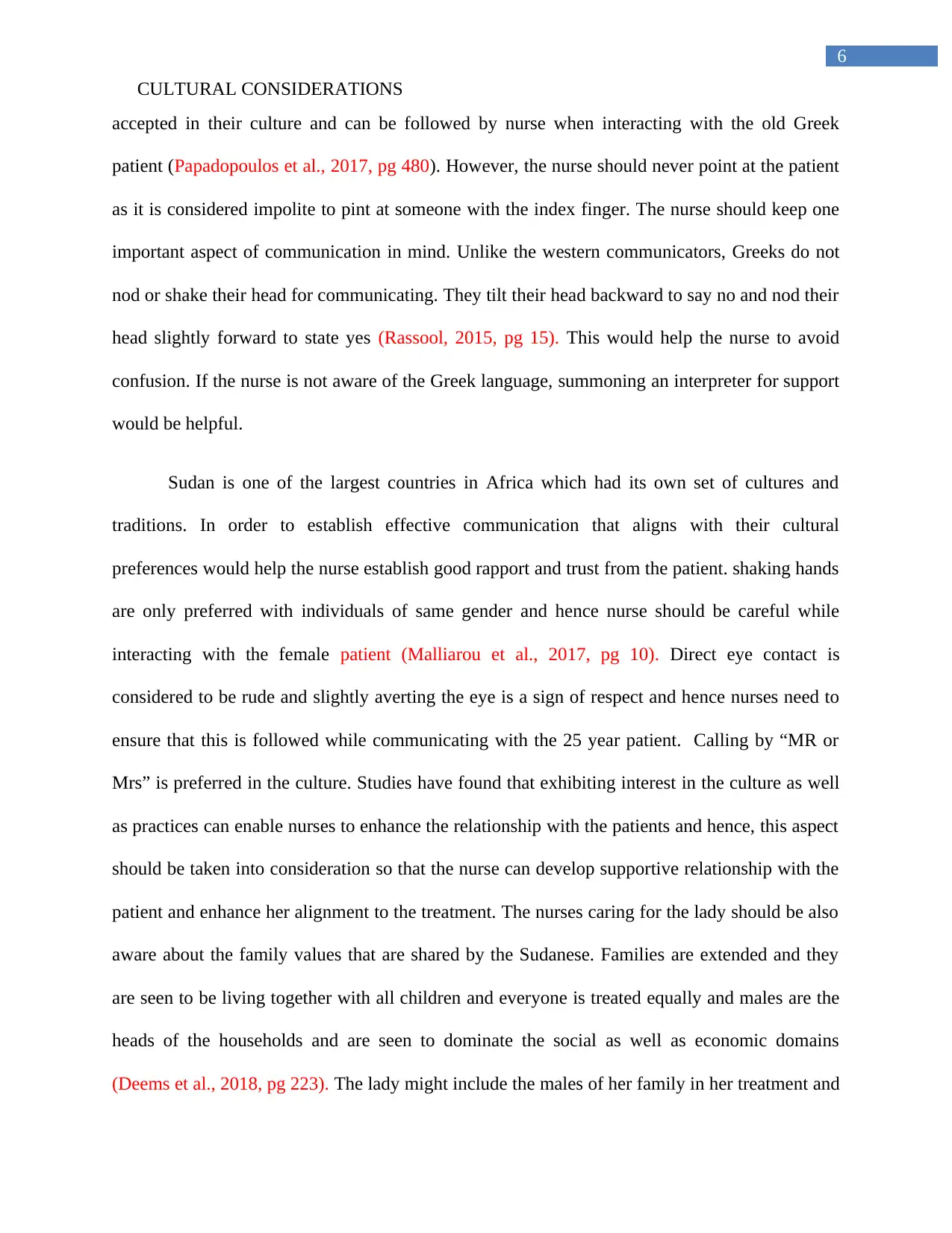
6
CULTURAL CONSIDERATIONS
accepted in their culture and can be followed by nurse when interacting with the old Greek
patient (Papadopoulos et al., 2017, pg 480). However, the nurse should never point at the patient
as it is considered impolite to pint at someone with the index finger. The nurse should keep one
important aspect of communication in mind. Unlike the western communicators, Greeks do not
nod or shake their head for communicating. They tilt their head backward to say no and nod their
head slightly forward to state yes (Rassool, 2015, pg 15). This would help the nurse to avoid
confusion. If the nurse is not aware of the Greek language, summoning an interpreter for support
would be helpful.
Sudan is one of the largest countries in Africa which had its own set of cultures and
traditions. In order to establish effective communication that aligns with their cultural
preferences would help the nurse establish good rapport and trust from the patient. shaking hands
are only preferred with individuals of same gender and hence nurse should be careful while
interacting with the female patient (Malliarou et al., 2017, pg 10). Direct eye contact is
considered to be rude and slightly averting the eye is a sign of respect and hence nurses need to
ensure that this is followed while communicating with the 25 year patient. Calling by “MR or
Mrs” is preferred in the culture. Studies have found that exhibiting interest in the culture as well
as practices can enable nurses to enhance the relationship with the patients and hence, this aspect
should be taken into consideration so that the nurse can develop supportive relationship with the
patient and enhance her alignment to the treatment. The nurses caring for the lady should be also
aware about the family values that are shared by the Sudanese. Families are extended and they
are seen to be living together with all children and everyone is treated equally and males are the
heads of the households and are seen to dominate the social as well as economic domains
(Deems et al., 2018, pg 223). The lady might include the males of her family in her treatment and
CULTURAL CONSIDERATIONS
accepted in their culture and can be followed by nurse when interacting with the old Greek
patient (Papadopoulos et al., 2017, pg 480). However, the nurse should never point at the patient
as it is considered impolite to pint at someone with the index finger. The nurse should keep one
important aspect of communication in mind. Unlike the western communicators, Greeks do not
nod or shake their head for communicating. They tilt their head backward to say no and nod their
head slightly forward to state yes (Rassool, 2015, pg 15). This would help the nurse to avoid
confusion. If the nurse is not aware of the Greek language, summoning an interpreter for support
would be helpful.
Sudan is one of the largest countries in Africa which had its own set of cultures and
traditions. In order to establish effective communication that aligns with their cultural
preferences would help the nurse establish good rapport and trust from the patient. shaking hands
are only preferred with individuals of same gender and hence nurse should be careful while
interacting with the female patient (Malliarou et al., 2017, pg 10). Direct eye contact is
considered to be rude and slightly averting the eye is a sign of respect and hence nurses need to
ensure that this is followed while communicating with the 25 year patient. Calling by “MR or
Mrs” is preferred in the culture. Studies have found that exhibiting interest in the culture as well
as practices can enable nurses to enhance the relationship with the patients and hence, this aspect
should be taken into consideration so that the nurse can develop supportive relationship with the
patient and enhance her alignment to the treatment. The nurses caring for the lady should be also
aware about the family values that are shared by the Sudanese. Families are extended and they
are seen to be living together with all children and everyone is treated equally and males are the
heads of the households and are seen to dominate the social as well as economic domains
(Deems et al., 2018, pg 223). The lady might include the males of her family in her treatment and
Paraphrase This Document
Need a fresh take? Get an instant paraphrase of this document with our AI Paraphraser
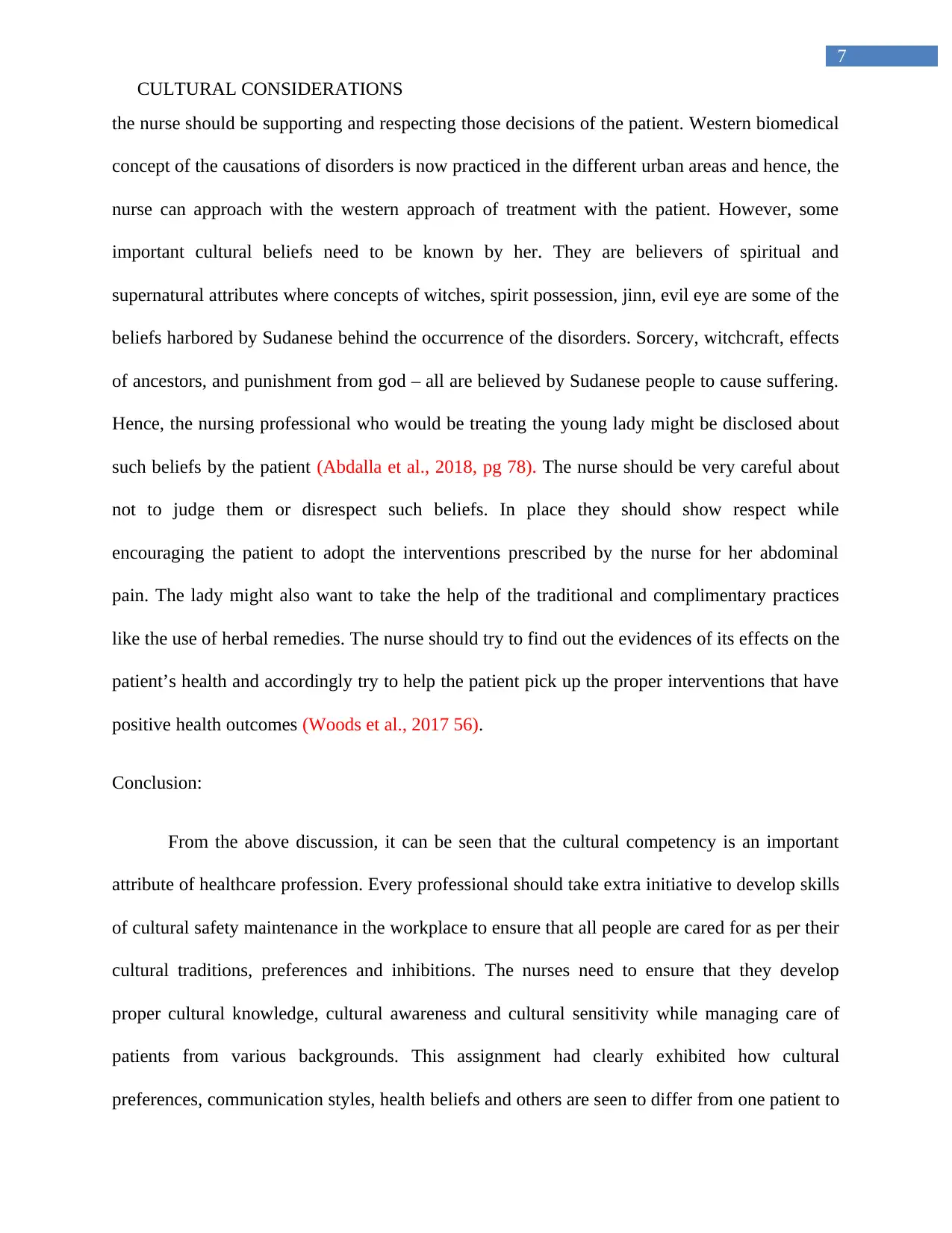
7
CULTURAL CONSIDERATIONS
the nurse should be supporting and respecting those decisions of the patient. Western biomedical
concept of the causations of disorders is now practiced in the different urban areas and hence, the
nurse can approach with the western approach of treatment with the patient. However, some
important cultural beliefs need to be known by her. They are believers of spiritual and
supernatural attributes where concepts of witches, spirit possession, jinn, evil eye are some of the
beliefs harbored by Sudanese behind the occurrence of the disorders. Sorcery, witchcraft, effects
of ancestors, and punishment from god – all are believed by Sudanese people to cause suffering.
Hence, the nursing professional who would be treating the young lady might be disclosed about
such beliefs by the patient (Abdalla et al., 2018, pg 78). The nurse should be very careful about
not to judge them or disrespect such beliefs. In place they should show respect while
encouraging the patient to adopt the interventions prescribed by the nurse for her abdominal
pain. The lady might also want to take the help of the traditional and complimentary practices
like the use of herbal remedies. The nurse should try to find out the evidences of its effects on the
patient’s health and accordingly try to help the patient pick up the proper interventions that have
positive health outcomes (Woods et al., 2017 56).
Conclusion:
From the above discussion, it can be seen that the cultural competency is an important
attribute of healthcare profession. Every professional should take extra initiative to develop skills
of cultural safety maintenance in the workplace to ensure that all people are cared for as per their
cultural traditions, preferences and inhibitions. The nurses need to ensure that they develop
proper cultural knowledge, cultural awareness and cultural sensitivity while managing care of
patients from various backgrounds. This assignment had clearly exhibited how cultural
preferences, communication styles, health beliefs and others are seen to differ from one patient to
CULTURAL CONSIDERATIONS
the nurse should be supporting and respecting those decisions of the patient. Western biomedical
concept of the causations of disorders is now practiced in the different urban areas and hence, the
nurse can approach with the western approach of treatment with the patient. However, some
important cultural beliefs need to be known by her. They are believers of spiritual and
supernatural attributes where concepts of witches, spirit possession, jinn, evil eye are some of the
beliefs harbored by Sudanese behind the occurrence of the disorders. Sorcery, witchcraft, effects
of ancestors, and punishment from god – all are believed by Sudanese people to cause suffering.
Hence, the nursing professional who would be treating the young lady might be disclosed about
such beliefs by the patient (Abdalla et al., 2018, pg 78). The nurse should be very careful about
not to judge them or disrespect such beliefs. In place they should show respect while
encouraging the patient to adopt the interventions prescribed by the nurse for her abdominal
pain. The lady might also want to take the help of the traditional and complimentary practices
like the use of herbal remedies. The nurse should try to find out the evidences of its effects on the
patient’s health and accordingly try to help the patient pick up the proper interventions that have
positive health outcomes (Woods et al., 2017 56).
Conclusion:
From the above discussion, it can be seen that the cultural competency is an important
attribute of healthcare profession. Every professional should take extra initiative to develop skills
of cultural safety maintenance in the workplace to ensure that all people are cared for as per their
cultural traditions, preferences and inhibitions. The nurses need to ensure that they develop
proper cultural knowledge, cultural awareness and cultural sensitivity while managing care of
patients from various backgrounds. This assignment had clearly exhibited how cultural
preferences, communication styles, health beliefs and others are seen to differ from one patient to
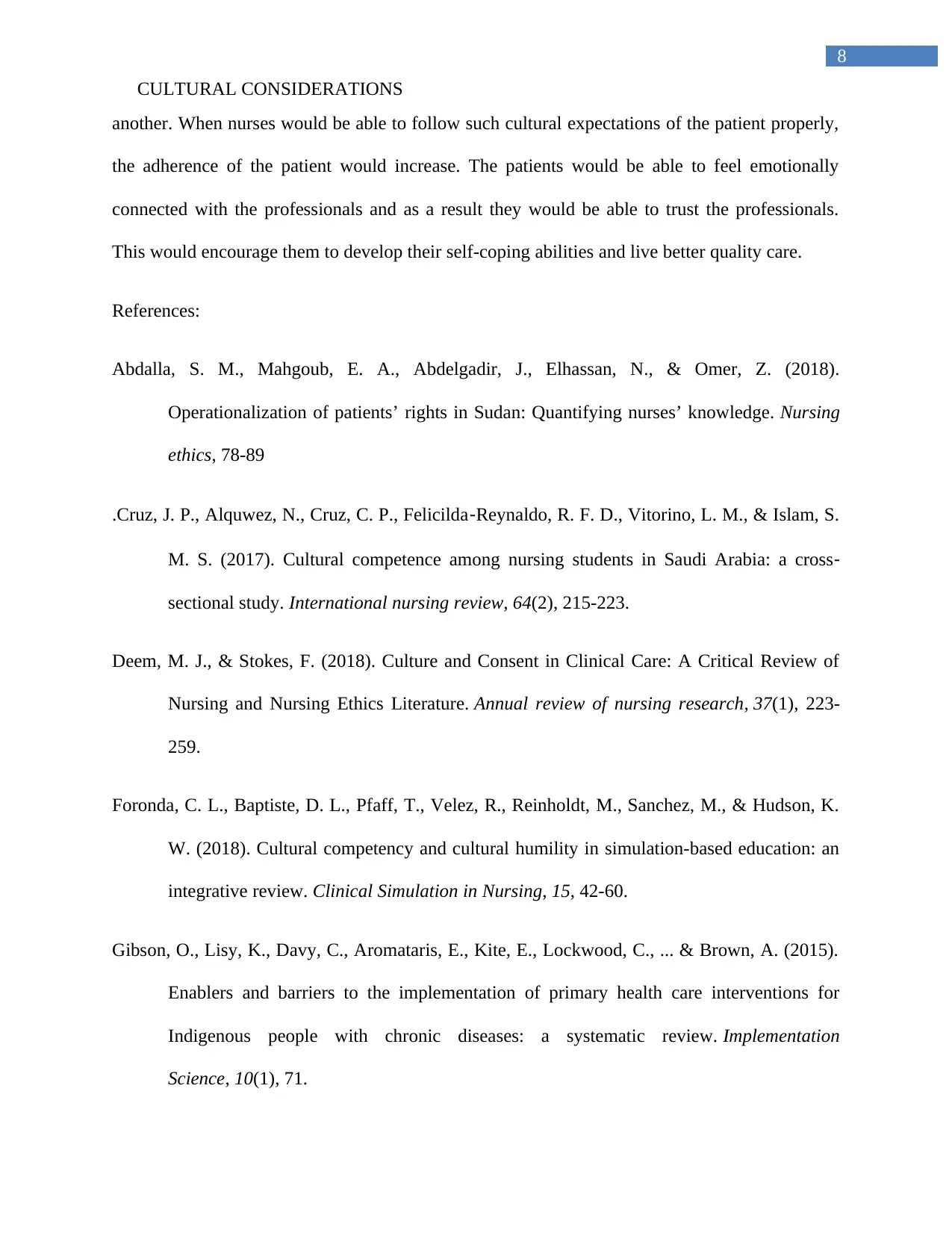
8
CULTURAL CONSIDERATIONS
another. When nurses would be able to follow such cultural expectations of the patient properly,
the adherence of the patient would increase. The patients would be able to feel emotionally
connected with the professionals and as a result they would be able to trust the professionals.
This would encourage them to develop their self-coping abilities and live better quality care.
References:
Abdalla, S. M., Mahgoub, E. A., Abdelgadir, J., Elhassan, N., & Omer, Z. (2018).
Operationalization of patients’ rights in Sudan: Quantifying nurses’ knowledge. Nursing
ethics, 78-89
.Cruz, J. P., Alquwez, N., Cruz, C. P., Felicilda‐Reynaldo, R. F. D., Vitorino, L. M., & Islam, S.
M. S. (2017). Cultural competence among nursing students in Saudi Arabia: a cross‐
sectional study. International nursing review, 64(2), 215-223.
Deem, M. J., & Stokes, F. (2018). Culture and Consent in Clinical Care: A Critical Review of
Nursing and Nursing Ethics Literature. Annual review of nursing research, 37(1), 223-
259.
Foronda, C. L., Baptiste, D. L., Pfaff, T., Velez, R., Reinholdt, M., Sanchez, M., & Hudson, K.
W. (2018). Cultural competency and cultural humility in simulation-based education: an
integrative review. Clinical Simulation in Nursing, 15, 42-60.
Gibson, O., Lisy, K., Davy, C., Aromataris, E., Kite, E., Lockwood, C., ... & Brown, A. (2015).
Enablers and barriers to the implementation of primary health care interventions for
Indigenous people with chronic diseases: a systematic review. Implementation
Science, 10(1), 71.
CULTURAL CONSIDERATIONS
another. When nurses would be able to follow such cultural expectations of the patient properly,
the adherence of the patient would increase. The patients would be able to feel emotionally
connected with the professionals and as a result they would be able to trust the professionals.
This would encourage them to develop their self-coping abilities and live better quality care.
References:
Abdalla, S. M., Mahgoub, E. A., Abdelgadir, J., Elhassan, N., & Omer, Z. (2018).
Operationalization of patients’ rights in Sudan: Quantifying nurses’ knowledge. Nursing
ethics, 78-89
.Cruz, J. P., Alquwez, N., Cruz, C. P., Felicilda‐Reynaldo, R. F. D., Vitorino, L. M., & Islam, S.
M. S. (2017). Cultural competence among nursing students in Saudi Arabia: a cross‐
sectional study. International nursing review, 64(2), 215-223.
Deem, M. J., & Stokes, F. (2018). Culture and Consent in Clinical Care: A Critical Review of
Nursing and Nursing Ethics Literature. Annual review of nursing research, 37(1), 223-
259.
Foronda, C. L., Baptiste, D. L., Pfaff, T., Velez, R., Reinholdt, M., Sanchez, M., & Hudson, K.
W. (2018). Cultural competency and cultural humility in simulation-based education: an
integrative review. Clinical Simulation in Nursing, 15, 42-60.
Gibson, O., Lisy, K., Davy, C., Aromataris, E., Kite, E., Lockwood, C., ... & Brown, A. (2015).
Enablers and barriers to the implementation of primary health care interventions for
Indigenous people with chronic diseases: a systematic review. Implementation
Science, 10(1), 71.
⊘ This is a preview!⊘
Do you want full access?
Subscribe today to unlock all pages.

Trusted by 1+ million students worldwide
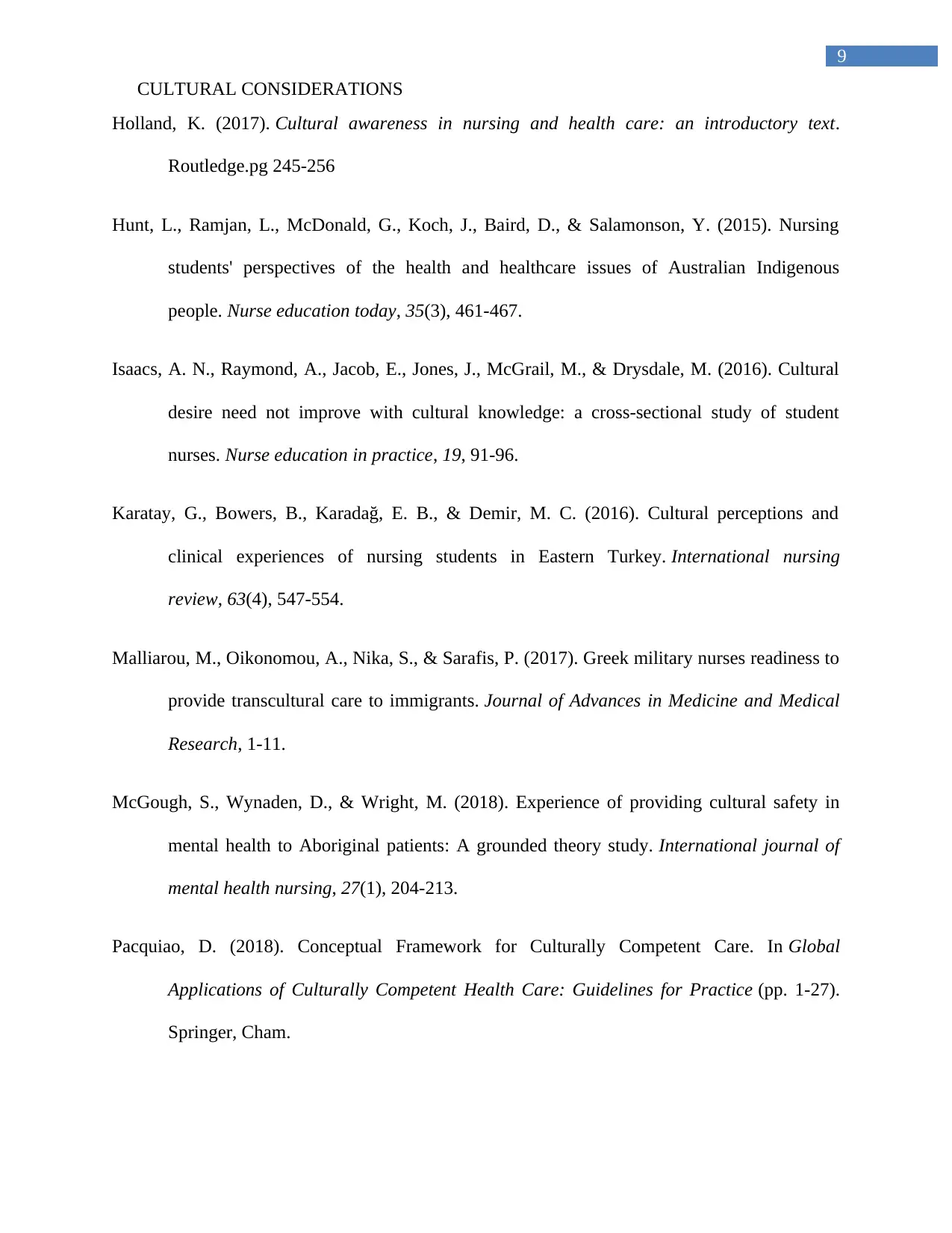
9
CULTURAL CONSIDERATIONS
Holland, K. (2017). Cultural awareness in nursing and health care: an introductory text.
Routledge.pg 245-256
Hunt, L., Ramjan, L., McDonald, G., Koch, J., Baird, D., & Salamonson, Y. (2015). Nursing
students' perspectives of the health and healthcare issues of Australian Indigenous
people. Nurse education today, 35(3), 461-467.
Isaacs, A. N., Raymond, A., Jacob, E., Jones, J., McGrail, M., & Drysdale, M. (2016). Cultural
desire need not improve with cultural knowledge: a cross-sectional study of student
nurses. Nurse education in practice, 19, 91-96.
Karatay, G., Bowers, B., Karadağ, E. B., & Demir, M. C. (2016). Cultural perceptions and
clinical experiences of nursing students in Eastern Turkey. International nursing
review, 63(4), 547-554.
Malliarou, M., Oikonomou, A., Nika, S., & Sarafis, P. (2017). Greek military nurses readiness to
provide transcultural care to immigrants. Journal of Advances in Medicine and Medical
Research, 1-11.
McGough, S., Wynaden, D., & Wright, M. (2018). Experience of providing cultural safety in
mental health to Aboriginal patients: A grounded theory study. International journal of
mental health nursing, 27(1), 204-213.
Pacquiao, D. (2018). Conceptual Framework for Culturally Competent Care. In Global
Applications of Culturally Competent Health Care: Guidelines for Practice (pp. 1-27).
Springer, Cham.
CULTURAL CONSIDERATIONS
Holland, K. (2017). Cultural awareness in nursing and health care: an introductory text.
Routledge.pg 245-256
Hunt, L., Ramjan, L., McDonald, G., Koch, J., Baird, D., & Salamonson, Y. (2015). Nursing
students' perspectives of the health and healthcare issues of Australian Indigenous
people. Nurse education today, 35(3), 461-467.
Isaacs, A. N., Raymond, A., Jacob, E., Jones, J., McGrail, M., & Drysdale, M. (2016). Cultural
desire need not improve with cultural knowledge: a cross-sectional study of student
nurses. Nurse education in practice, 19, 91-96.
Karatay, G., Bowers, B., Karadağ, E. B., & Demir, M. C. (2016). Cultural perceptions and
clinical experiences of nursing students in Eastern Turkey. International nursing
review, 63(4), 547-554.
Malliarou, M., Oikonomou, A., Nika, S., & Sarafis, P. (2017). Greek military nurses readiness to
provide transcultural care to immigrants. Journal of Advances in Medicine and Medical
Research, 1-11.
McGough, S., Wynaden, D., & Wright, M. (2018). Experience of providing cultural safety in
mental health to Aboriginal patients: A grounded theory study. International journal of
mental health nursing, 27(1), 204-213.
Pacquiao, D. (2018). Conceptual Framework for Culturally Competent Care. In Global
Applications of Culturally Competent Health Care: Guidelines for Practice (pp. 1-27).
Springer, Cham.
Paraphrase This Document
Need a fresh take? Get an instant paraphrase of this document with our AI Paraphraser
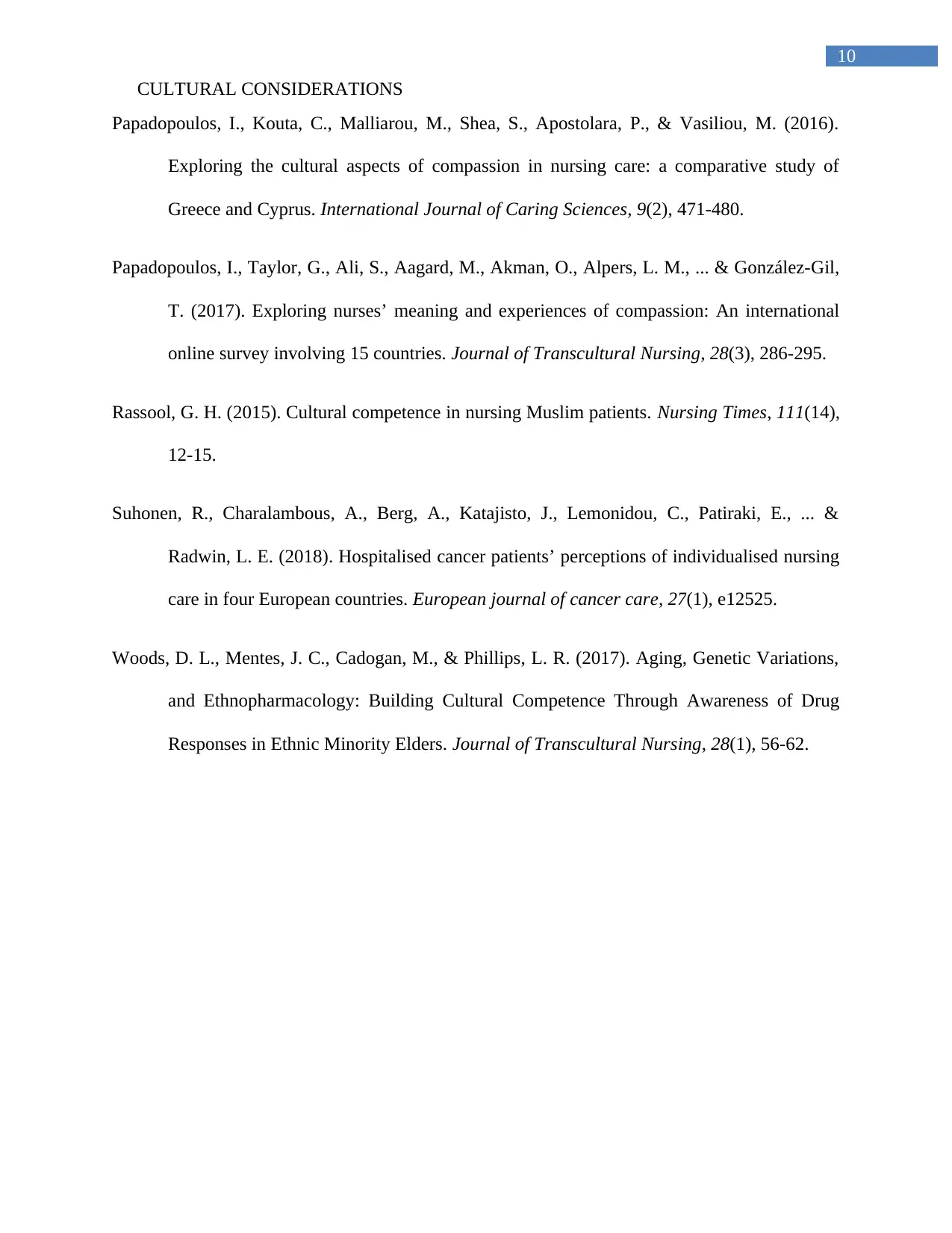
10
CULTURAL CONSIDERATIONS
Papadopoulos, I., Kouta, C., Malliarou, M., Shea, S., Apostolara, P., & Vasiliou, M. (2016).
Exploring the cultural aspects of compassion in nursing care: a comparative study of
Greece and Cyprus. International Journal of Caring Sciences, 9(2), 471-480.
Papadopoulos, I., Taylor, G., Ali, S., Aagard, M., Akman, O., Alpers, L. M., ... & González-Gil,
T. (2017). Exploring nurses’ meaning and experiences of compassion: An international
online survey involving 15 countries. Journal of Transcultural Nursing, 28(3), 286-295.
Rassool, G. H. (2015). Cultural competence in nursing Muslim patients. Nursing Times, 111(14),
12-15.
Suhonen, R., Charalambous, A., Berg, A., Katajisto, J., Lemonidou, C., Patiraki, E., ... &
Radwin, L. E. (2018). Hospitalised cancer patients’ perceptions of individualised nursing
care in four European countries. European journal of cancer care, 27(1), e12525.
Woods, D. L., Mentes, J. C., Cadogan, M., & Phillips, L. R. (2017). Aging, Genetic Variations,
and Ethnopharmacology: Building Cultural Competence Through Awareness of Drug
Responses in Ethnic Minority Elders. Journal of Transcultural Nursing, 28(1), 56-62.
CULTURAL CONSIDERATIONS
Papadopoulos, I., Kouta, C., Malliarou, M., Shea, S., Apostolara, P., & Vasiliou, M. (2016).
Exploring the cultural aspects of compassion in nursing care: a comparative study of
Greece and Cyprus. International Journal of Caring Sciences, 9(2), 471-480.
Papadopoulos, I., Taylor, G., Ali, S., Aagard, M., Akman, O., Alpers, L. M., ... & González-Gil,
T. (2017). Exploring nurses’ meaning and experiences of compassion: An international
online survey involving 15 countries. Journal of Transcultural Nursing, 28(3), 286-295.
Rassool, G. H. (2015). Cultural competence in nursing Muslim patients. Nursing Times, 111(14),
12-15.
Suhonen, R., Charalambous, A., Berg, A., Katajisto, J., Lemonidou, C., Patiraki, E., ... &
Radwin, L. E. (2018). Hospitalised cancer patients’ perceptions of individualised nursing
care in four European countries. European journal of cancer care, 27(1), e12525.
Woods, D. L., Mentes, J. C., Cadogan, M., & Phillips, L. R. (2017). Aging, Genetic Variations,
and Ethnopharmacology: Building Cultural Competence Through Awareness of Drug
Responses in Ethnic Minority Elders. Journal of Transcultural Nursing, 28(1), 56-62.
1 out of 11
Related Documents
Your All-in-One AI-Powered Toolkit for Academic Success.
+13062052269
info@desklib.com
Available 24*7 on WhatsApp / Email
![[object Object]](/_next/static/media/star-bottom.7253800d.svg)
Unlock your academic potential
Copyright © 2020–2025 A2Z Services. All Rights Reserved. Developed and managed by ZUCOL.




